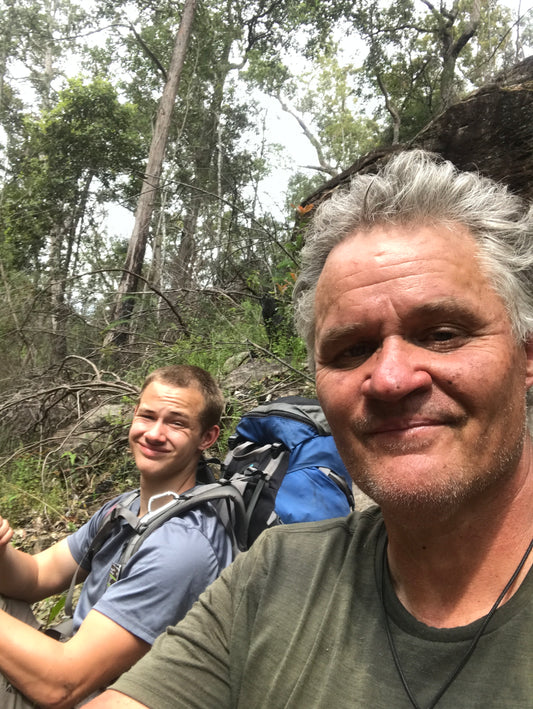In 1865 Blaxland was the scene of a fatal accident for one of the most unusual figures in colonial history. Sir Frederick Pottinger had once been a member of the Grenadier Guards, but had blown his inheritance in London on fast living. Exiled to Australia, he dropped his title and joined the NSW Mounted Police as a humble trooper, being promoted after news of his blue blood emerged.
He became the leader of the police effort against Ben Hall and his gang of bushrangers in the Forbes area, where the energy of his efforts was matched only by his lack of success. As a titled Pom, he was mocked by some of the Sydney newspapers, not least when he became involved in the occasional drunken pub brawl.

After a few years of failing to capture Ben Hall, Pottinger came up with a cunning scheme: he would ride in a race at a local course at Wowingragong, the idea being this would draw out the bushrangers, who would then be captured by the police. Just why the bushrangers would be lured was a puzzle to everyone but Sir Frederick, who proceeded to ride in the race – even though this was against police regulations.
The inspector-general of police, a Scotsman named John McLerie, demanded a report from Pottinger, who replied in early February on fourteen tightly written pages of foolscap. The tone swung from haughty justification to chatty asides of no relevance to the matter in hand. He said that he had ridden in two races “under circumstances and for reasons, which, I feel certain you will on due consideration agree with me, fully warranted the discretionary departure in point from the letter (tho’ not the spirit) of the ‘General Order’ to which (I conclude) your ‘Memo’ refers.”
As to his riding in the first of the races, the ‘Ladies’ Bag’ on the first day, he had been urged to participate by his squatter friends and their wives. Had he not done so it would have been ungracious and “unsatisfactorily reflected on my character personally and socially” and indeed, have left him open to misconstructions “prejudicial to my position and interests officially”.
The explanation for riding in a second race was that the bushrangers’ presence near the racecourse being suspected, the idea was that he would fall well behind the other horse (it was a two-horse race), thereby encouraging the bushrangers to attack him on a secluded part of the track. In other words, he had valiantly offered himself as bait.
The problem with this was that the justification for riding in the first race had nothing to do with catching bushrangers, while the reason for the second was wildly implausible – why would the bushrangers want to kill a man who had been so successful in keeping them alive and at freedom over three years?
To add to Pottinger’s problems, the horror of the bushranging activities had escalated dramatically in the weeks after the race meeting. On 26 January, after working the road at Geary’s Gap near Lake George, Hall’s gangsters went into the village of Collector and took over the pub. A young girl ran to tell the one policeman then in the town, Constable Samuel Nelson. The thirty-eight-year old officer told his wife, who was six months pregnant, “Now, I am just going to do my best” and walked towards the pub, as did his eighteen-year-old son.
A young member of Hall’s gang, John Dunn, was standing behind a fence, guarding some of the villagers. When he saw the constable he called on him to stand and immediately fired. Nelson staggered and said, “Oh!”, and Dunn shot him again. He then turned his gun on the son, who fortunately escaped.
The murder of Nelson in cold blood caused a storm. Until then, bushrangers were – arguably, at least - oppressed rural strugglers. Now they were exposed as nothing but callous murderers. Soon after, the premier notified Inspector-general McLerie: “Within two months from this date, either suppress bushranging or resign.”
It was no time for Sir Frederick, the man in charge of the police effort, to be disobeying orders.
In the first week of February the Hall gang was on the road from Braidwood to Goulburn when they encountered another rare instance of resistance. They tried to hold up a four-in-hand containing the sons of a wealthy pastoralist. The older lads, William and George Faithfull, were taking their young brothers Henry and Reginald back to school. When the bushrangers attacked, the brothers, who had just emerged from the front gate of their home, Springfield Station, jumped out of the dray and used it as cover, and a gun fight ensued. Soon one of the horses was wounded and the animals panicked and raced off, leaving the boys exposed. They clambered through the fence and Gilbert rode up and took careful aim at William’s back, but just as he went to shoot, his horse reared and took the shot in the back of its neck, falling down dead.
The boys retreated to the homestead, which was a mile away, followed for some time by Hall, the only bushranger who still had a loaded weapon. But William kept him at bay by training his rifle on him, although not firing, as he had only one shot left. The boys reached home, grabbed more weapons and raced out to re-engage the bushrangers, but the gang had left – after looting the boys’ school bags.
The brothers were widely praised for their actions. George commented, “We could not have faced our mother if we had been beaten.”
Many observers noted how school children seemed to have more success than policemen in dealing with the bushranger threat.
So Sir Frederick Pottinger was sacked. On 14 February a meeting was held in Forbes and a resolution passed to send a letter to the Executive Council asking for his restoration. In March a letter to the editor of the Sydney Morning Herald claimed that Fred had been dismissed after complaints from people in Forbes of “very dubious reputation”. In contrast, asserted the anonymous author, the list of those who signed the letter to the Executive Council contradicting these complaints “includes the name of every man of standing, influence or repute in Forbes and in the three adjacent districts of Orange, Wellington, and [Lambing Flat].”
Again and again, petitions and newspaper articles from the areas where Pottinger had operated spoke with direct knowledge of his success in suppressing bushrangers. That success was not absolute, but, relative to the problems he faced, it was considerable. One petition from Forbes said its signatories had complete confidence in Fred and listed dozens of arrests made by him and his men. It suggested he was in fact the most effective commander in western New South Wales.
No doubt encouraged by this support, Sir Frederick decided to go to Sydney and appeal directly to John McLerie. He travelled by coach, and along the way it stopped at a place called Wascoe’s Inn, in what is now the town of Blaxland.
Sir Frederick got down to stretch his legs, and walked over to a nearby orchard to pick some fruit. The coach driver started off without him. Why he did this remains a mystery. Possibly Sir Frederick was delaying the coach and the driver resented this. Possibly Fred assumed the driver would wait for him because he was a baronet and a – recently dismissed – senior official.
Whatever the cause, the coach began to roll and Sir Frederick ran after it and jumped aboard. He was carrying a small pistol in his waistcoat pocket, and as he got back inside, it must have been bumped, because it discharged, the bullet entering his body just below the ribs, travelling in a downwards direction.
The accident was almost unbelievable. For it to occur, the hammer of the pistol must have been drawn back at the time it bumped in the coach, and then released so it made sharp contact with a charge waiting for it. Obviously, pistols are intended to be kept in a condition making such an accident impossible. The only reason not to keep a pistol in such a safe condition would be if one expected danger, but in the Mountains at the time this was highly unlikely.
We are therefore forced to the conclusion that the gun was capable of discharging due to the carelessness of its owner, an experienced soldier and police officer. Which fits in completely with what we know about the reckless character if the thirty-three-year-old Sir Frederick Pottinger.
He did not die in the Blue Mountains, but at the the Victoria Club in Sydney. The Premier was a member. Sir Frederick was buried at Saint Jude’s in Randwick, where his grave can be seen today. There used to be a display about him in McDonald’s Blaxland, created by the late great bushranger historian and Blackheath resident Edgar Penzig. Sadly it no longer exists.




